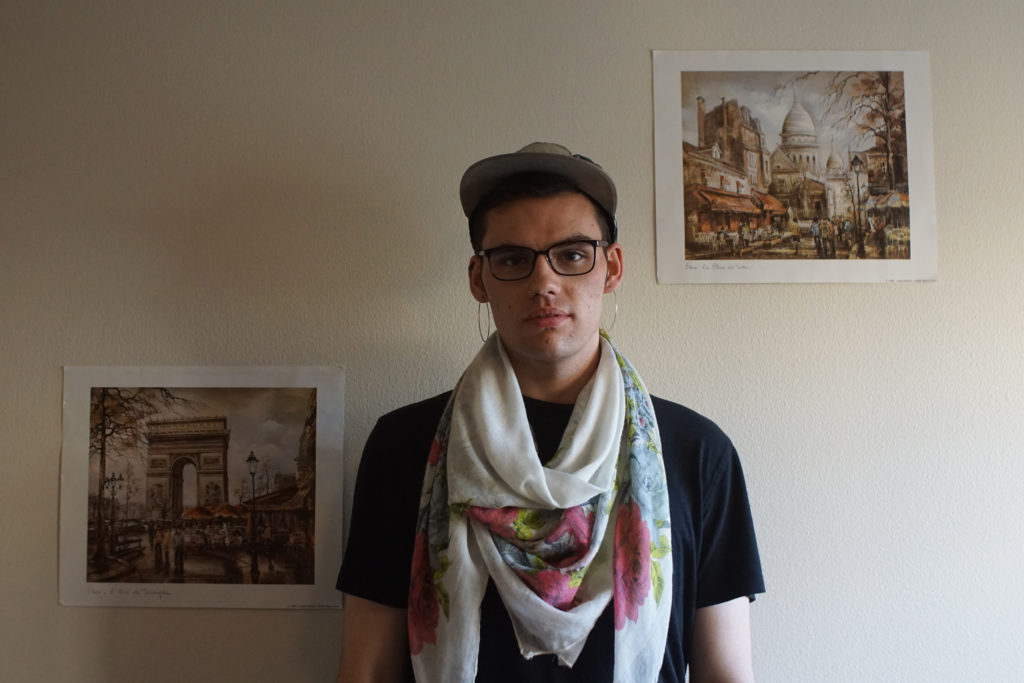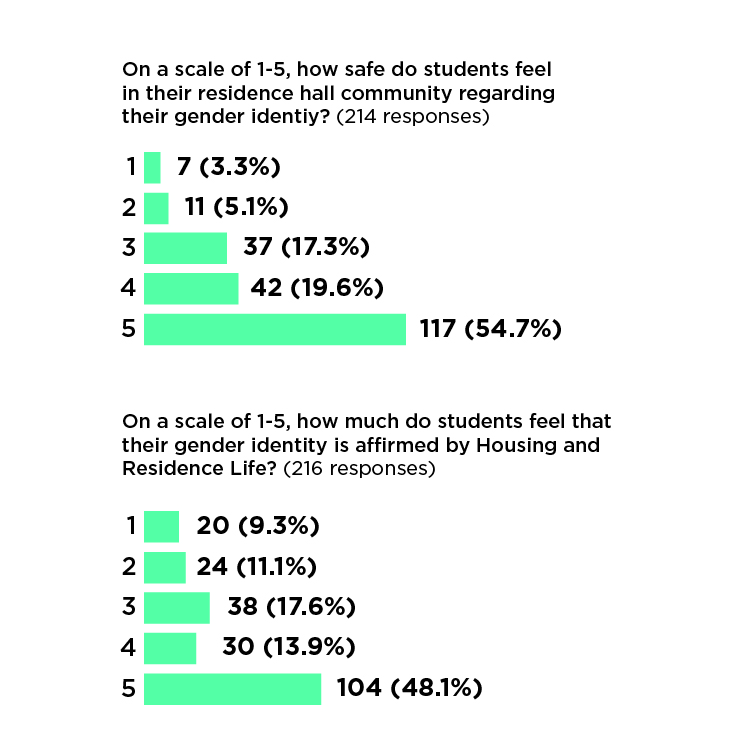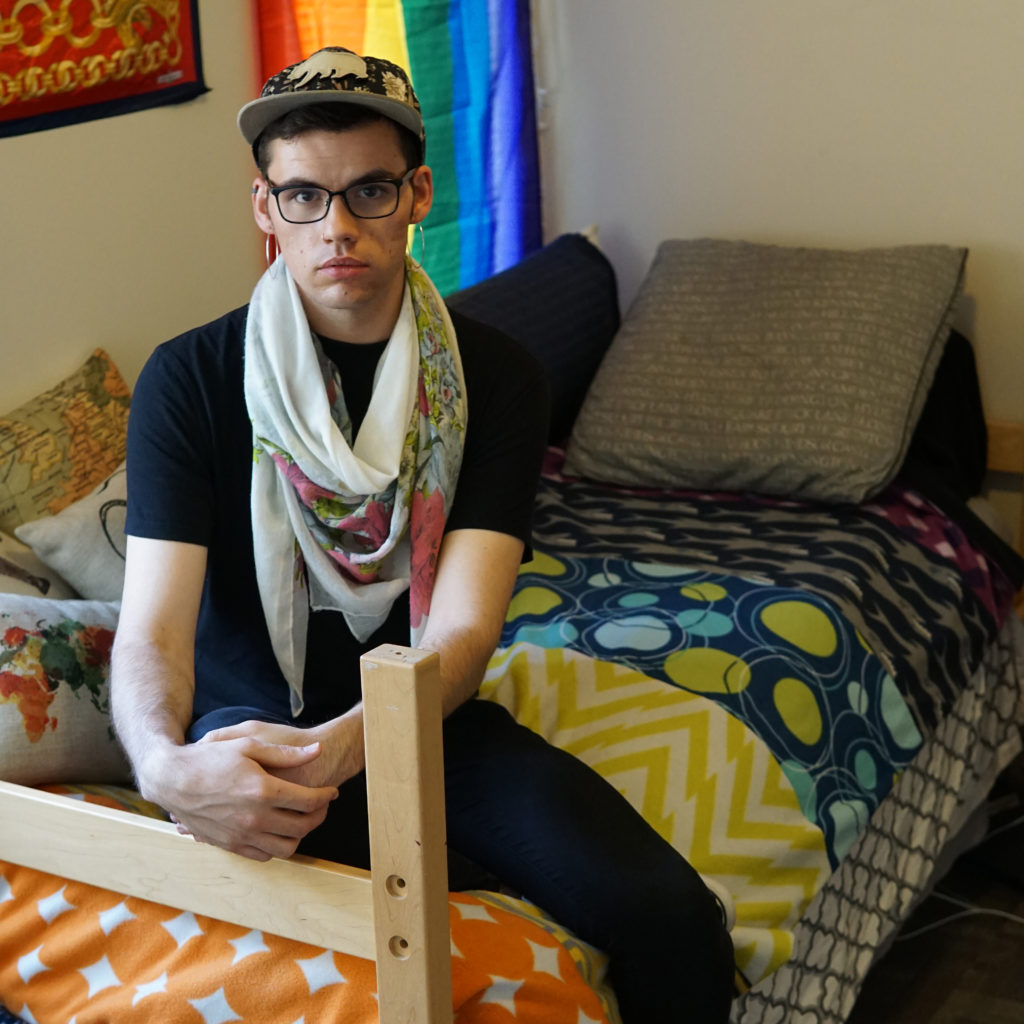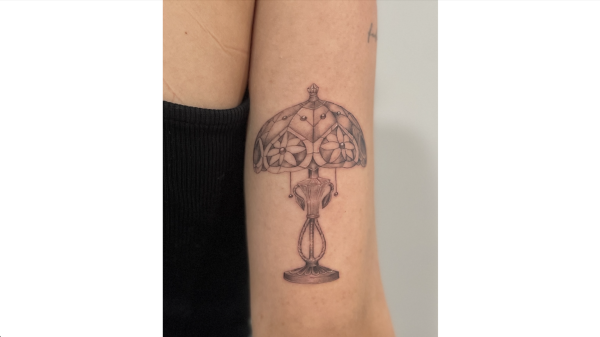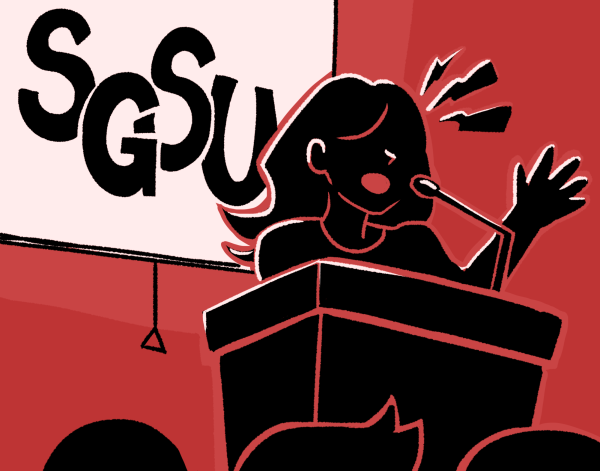Finding a Place to Call Home: Students Struggle to Find Gender-Inclusive Housing on Campus
“It’s not my job to go through back channels to try to make sure that I’m living in a safe environment,” said Michael Clymer, a sophomore political science and French major who identifies outside of the gender binary. “That is the university’s first and foremost job: education and a safe living environment.”
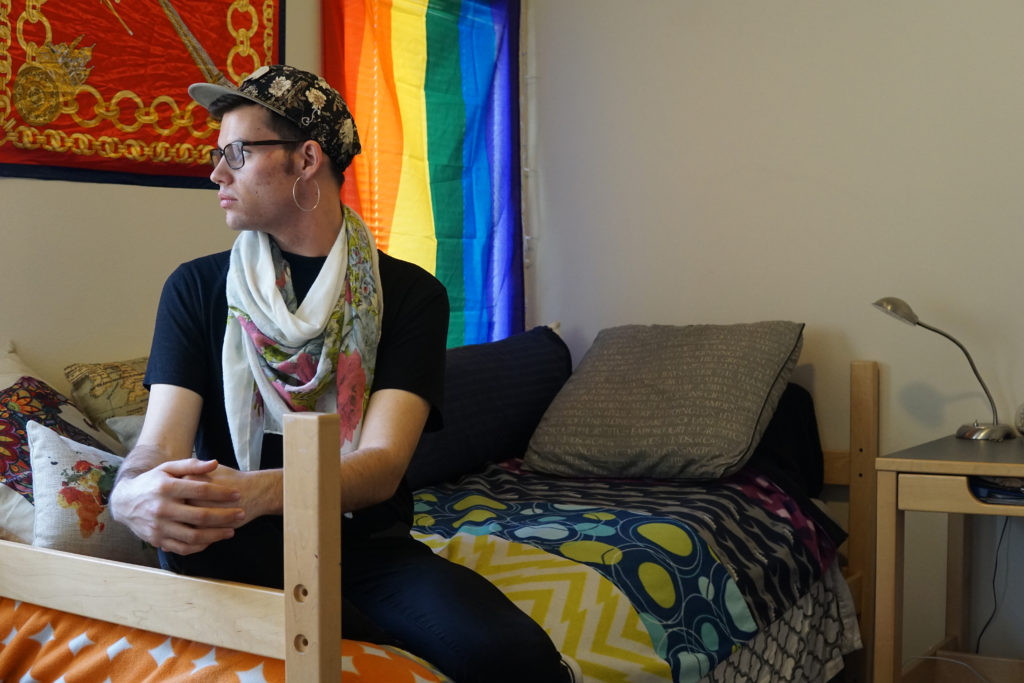
Despite being a Sulivan Scholar, Michael Clymer is paying an extra thousand dollars per quarter for a single room.
Seattle University Housing and Residence Life (HRL) has no formal policy regarding housing accommodations for non-binary and gender nonconforming students. This gives HRL a wide range of options to accommodate students on an individualized basis, but ultimately many LGBTQ+ students feel that they get lost in the bureaucracy.
Clymer said that their search for housing options this past year caused anxiety, frustration and emotional trauma.
“I had never really conceptualized the fact that, once I had gone to college, I would have to live with cis men,” Clymer said. “I hadn’t realized that (a) I would have to do that or (b) that it would be a problem. But the more I thought about it, the more I realized that as a queer person, I was not okay living with what would most likely be a cis, straight man, and I felt very uncomfortable and very unsafe in that environment.”
As a result, Clymer, under the impression that they would not be allowed to live with a group of women or other non-binary individuals, went to Disabilities Services so that they would be guaranteed single-person housing.
“I’m currently living alone because I cannot live with people I would feel safe and comfortable living with. I would much prefer to be living in a community and I can’t be doing that, and that was never communicated that that was a possibility for me.”
-Michael Clymer, Sophomore
This year Clymer is living in a single-person Murphy apartment, where they pay at least $1,000 more per quarter than they would for a double or triple room in Campion or Bellarmine Hall.
However, throughout this process, no one in HRL made Clymer aware that they didn’t actually need to live alone.
Though the policy regarding non-binary students isn’t explicitly outlined, HRL tends to accommodate these students in one of two ways.
“We allow the trans students to live with students of the gender that they identify with,” said Tim Albert, associate director of HRL Tim Albert. “And for non-binary students, the solutions can look a little bit different, but typically they have selected a roommate and we’ve usually accommodated that need.”
Some students, like Clymer, may choose to live in single-person housing. Single rooms on campus, of which there are a limited number, are normally reserved for students registered with a disability under the Americans with Disabilities Act (ADA). However, both Albert and Campion Residence Director Armina Khwaja made it explicitly clear that HRL does not require non-binary students to register with a disability to be assigned to a single room.
“I mean, there’s a lot of things that fall under ADA,” Khwaja said. “That is a way to get a single, but that is not the only way to get a single. Also, to label gender expression as a disability is totally inappropriate.”
Upon learning that they could have lived with a roommate of their choice all along, Clymer said they felt frustrated and disappointed.
“Everyone I asked, everyone I talked to, everything I read told me that it was impossible; that I only could live alone, and that the only way I could live alone was through being registered in Disabilities Services,” they said.
Clymer added that living with other students would have made this school year more enjoyable.
“I’m currently living alone because I cannot live with people I would feel safe and comfortable living with,” Clymer said. “I would much prefer to be living in a community and I can’t be doing that, and that was never communicated that that was a possibility for me.”
Another student, first-year international studies and political science major Malcolm Odell, also experienced hardship trying to accommodate his needs and concerns for safety. Odell, who identifies as a gay man, said he felt uncomfortable living with other men and asked HRL if there was a way to accommodate this request.
Odell talked to HRL about why he felt his situation made him feel uncomfortable and unsafe, and he ultimately felt unheard after months of emails and meetings with members of both housing and university administration. Next year, he will live in a Murphy quad with three other men.
The 2016-17 Seattle University Resident Handbook reserves all students the right to feel secure in one’s living space, and the right to be listened to and to be heard. Odell explained that those two rights were the majority of his argument for wanting to live with women.
“I looked at the [Resident Handbook] and also just the general Seattle U rulebook that they have online, and there isn’t really any section that specifically states that you have to have single-gender housing,” Odell said. “If you don’t have a written policy, how are you telling people that you have to comply with it?”
Odell added that he believes that Seattle U is jeopardizing students’ safety by not allowing them this type of accommodation.
“When I talked about why it was an uncomfortable situation for me, they told me that Seattle University wouldn’t recognize my definition of an uncomfortable situation as an uncomfortable situation,” Odell said. “The tone of most of the meetings I went to was basically trying to tell me that my situation wasn’t actually as uncomfortable as I was saying it was.”
According to the Gender-Inclusive Housing Survey, which was conducted spring quarter of last year by the Residence Hall Association (RHA), about 45 percent of individuals who responded did not feel completely safe in residence halls regarding their gender identity.
Assistant Director of Residential Education Brian Hooks explained that initially when students bring forth these issues of discomfort, HRL attempts to engage in conversation with both sides and unpack the dynamics at play.
“Even if a person is saying, ‘I don’t feel safe,’ we’re still gonna navigate that conversation of… ‘What is it that you don’t feel safe about?’” Hooks said. “Sometimes there’s bias for someone that might not want to live with another male because of some misconstrued understanding of what masculinity means, or…a student thinking that they may be in some kind of harm’s way in some way or another, but not necessarily having anything to support that. It’s just more or less the thought or feeling of it.”
While there is a process for students who are non-binary to be accommodated, much of it requires coordination with administration and a significant amount of work for the student.
Cole Dedmon, RHA executive council director of programming, explained that there is a committee working to make these gender- inclusive options more accessible.
“There are existing support networks and things housing can do, if they are reached out to directly,” Dedmon said. “It shouldn’t necessarily have to be on the initiative of the individual who needs the service; it should be something that’s offered before they express that concern.”
Tucker Price, president of RHA, added that because this process is long and complicated, it can impact a resident’s ability to function.
“We didn’t want gender identity to be a hinderance to their ability to be the resident they wanted to be on campus,” Price said.
Per the results of last year’s survey, the Gender Inclusive Housing Committee within RHA is working to draft a statement that expresses student desire for gender-inclusive housing. Once this is complete, the Gender Inclusive Housing Committee hopes that the higher-ups in HRL will sign off on it, and then formally give it to the Board of Trustees for approval.
Dedmon and Price explained that there’s no formal structure, so non-binary students frequently find themselves going through unreasonably difficult solutions to their problems.
“The hope is to deal with that so it’s not a workaround, it’s just a normal process,” Dedmon said.
In order to do so, when the housing application is remodeled as a part of the “RevSU” campaign, the hope is that gender-inclusive options will be added. The Gender Inclusive Housing Committee said that they hope the updates will be in effect for the housing application for fall quarter 2018.
Ultimately, no solution will be in place for at least a year with regard to accommodations for non-binary students. However, there doesn’t seem to be any plan to allow for men and women to live together in the near future.
For now, Khwaja said that relative to other conservative Catholic institutions, Seattle U is doing comparatively well, despite its flaws.
“In comparison to some really conservative institutions that identify as private and religious, I feel like we’re actually in a really good place,” Khwaja said. “But there’s still so many flaws. We talked about self-disclosure [and] we talked about limitations of inventory…[but] we are open to meeting one-on-one with students, and trying to accommodate the best we can.”
Overall, Clymer and Odell both expressed frustration with the traditional structures embedded within the housing process.
“Why are we not telling students that this is a thing?” Clymer said. “Because it could have saved me so much angst and hassle and worry.”
Clymer said that by forcing non- binary students to navigate the resources themselves and take initiative, the university is not fulfilling its duty.
“Ultimately this university is here for the students, and if students are feeling unsafe in their housing, they’re failing at that most basic requirement of being a university,” Clymer said.
Odell explained further that the only people who are really aware of the limitations of non-gender-inclusive housing are the people who fall outside of traditional understandings of gender and sexuality.
“What are we valuing?” Clymer said. “The Catholic Jesuit value, or the people?”
Anna can be reached at
[email protected]
Josh can be reached at
[email protected]






